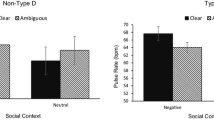Abstract
The study was an examination of the relationship between sociotropy and excessive reassurance seeking in the prediction of depression. Although there is an obvious theoretical link between these constructs, little empirical work has been directed at integrating these constructs. Because it was theorized that sociotropic persons would be relatively more likely to engage in excessive reassurance seeking relative to autonomous individuals, it was predicted that sociotropy, and not autonomy, would be positively related to excessive reassurance seeking. In addition, it was predicted that excessive reassurance seeking would mediate effects of sociotropy upon depression. Overall, the results from 167 undergraduates completing measures for all variables supported these predictions. The results suggest that beyond the psychological vulnerabilities hypothesized by A. T. Beck (1983), sociotropic persons might engage in interpersonal behaviors that exacerbate their response to life stress.
Similar content being viewed by others
REFERENCES
Allen, N. B., de la Horne, D. J., & Trinder, J. (1996). Sociotropy, autonomy, and dysphoric emotional responses to specific classes of stress:Apsychophysiological evaluation. Journal of Abnormal Psychology, 105, 25–33.
Bartelstone, J. H., & Trull, T. J. (1995). Personality, life events, and depression. Journal of Personality Assessment, 64, 279–294.
Beck, A. T. (1983). Cognitive therapy of depression: New perspectives. In P. J. Clayton & J. E. Barrett (Eds.), Treatment of depression: Old controversies and new approaches. New York: Raven Press.
Beck, A. T., Epstein, N., Harrison, R., & Emery, G. (1983). Development of the Sociotropy-Autonomy Scale: A measure of personality factors in psychopathology. Unpublished manuscript, University of Pennsylvania.
Clark, D. A., Beck, A. T., & Brown, G. K. (1992). Sociotropy, autonomy, and life event perceptions in dysphoric and nondysphoric individuals. Cognitive Therapy and Research, 16, 635–652.
Coyne, J. C. (1976). Toward an interactional description of depression. Psychiatry, 39, 14–27.
Hammen, C., Ellicott, A., & Gitlin, M. (1989). Vulnerability to specific life events and prediction of course of disorder in unipolar depressed patients. Canadian Journal of Behavioral Science, 21, 377–388.
Hammen, C., Ellicott, A., & Gitlin, M. (1992). Stressors and sociotropy/ autonomy: A longitudinal study of their relationship to the course of bipolar disorder. Cognitive Therapy and Research, 16, 409–418.
Hammen, C., Ellicott, A., Gitlin, M., & Jamison, K. R. (1989). Sociotropy/autonomy and vulnerability to specific life events in patients with unipolar depression and bipolar disorders. Journal of Abnormal Psychology, 98, 154–160.
Hammen, C., Marks, T., Mayol, A., & deMayo, R. (1985). Depressive self-schemas, life stress and vulnerability to depression. Journal of Abnormal Psychology, 94, 308–319.
Joiner, T. E., Jr., Alfano, M. S., & Metalsky, G. I. (1992). When depression breeds contempt: Reassurance-seeking, self-esteem, and rejection of depressed college students by their roommates. Journal of Abnormal Psychology, 101, 165–173.
Joiner, T. E., Jr., & Metalsky, G. I. (in press). Excessive reassurance seeking: Delineating a risk factor involved in the development of depressive symptoms. Psychological Science.
Joiner, T. E., Jr., & Metalsky, G. I. (1995). A prospective test of an integrative interpersonal theory of depression: A naturalistic study of college roommates. Journal of Personality and Social Psychology, 69, 778–788.
Joiner, T. E., Jr., & Schmidt, N. B. (1998). Excessive reassurance-seeking predicts depressive but not anxious reactions to acute stress. Journal of Abnormal Psychology, 107, 533–537.
Katz, J., Beach, S. R. H., & Joiner, T. E., Jr. (1998). When does partner devaluation predict emotional distress? Prospective moderating effects of reassurance-seeking and self-esteem. Personal Relationships, 5, 409–421.
Nietzel, M. T., & Harris, M. J. (1990). Relationship of dependency and achievement/autonomy to depression. Clinical Psychology Review, 10, 279–297.
Potthoff, J. G., Holahan, C. J., & Joiner, T. E. (1995). Reassurance seeking, stress generation, and depressive symptoms: An integrative model. Journal of Personality and Social Psychology, 68, 664–670.
Radloff, L. S. (1977). The CES-D Scale: A self-report depression scale for research in the general population. Applied Psychological Measurement, 1, 385–401.
Robins, C. J. (1990). Congruence of personality and life events in depression. Journal of Abnormal Psychology, 99, 393–397.
Robins, C. J., & Block, P. (1988). Personal vulnerability, life events, and depressive symptoms: A test of a specific interactional model. Journal of Personality and Social Psychology, 54, 847–852.
Robins, C. J., Block, P., & Peselow, E. D. (1989). Relations of sociotropic and autonomous personality characteristics to specific symptoms in depressed patients. Journal of Abnormal Psychology, 98, 86–88.
Robins, C. J., Hayes, A. M., Block, P., Kramer, R. J., & Villena, M. (1995). Interpersonal and achievement concerns and the depressive vulnerability and symptom specificity hypotheses: A prospective study. Cognitive Therapy and Research, 19, 1–20.
Robins, C. J., Ladd, J., Welkowitz, J., Blaney, P. H., Diaz, R., & Kutcher, G. (1994). The Personal Style Inventory: Preliminary validation studies of new measures of sociotropy and autonomy. Journal of Psychopathology and Behavioral Assessment, 16, 277–300.
Rude, S. S., & Burnham, B. L. (1993). Do interpersonal and achievement vulnerabilities interact with congruent events to predict depression? Comparison of DEQ, SAS, DAS, and combined scales. Cognitive Therapy and Research, 17, 531–548.
Strack, S., & Coyne, J. C. (1983). Social confirmation of dysphoria: Shared and private reactions to depression. Journal of Personality and Social Psychology, 44, 798–806.
Zuroff, D. C., & Mongrain, M. (1987). Dependency and self-criticism: Vulnerability factors for depressive active states. Journal of Abnormal Psychology, 96, 14–22.
Author information
Authors and Affiliations
Rights and permissions
About this article
Cite this article
Beck, R., Robbins, M., Taylor, C. et al. An Examination of Sociotropy and Excessive Reassurance Seeking in the Prediction of Depression. Journal of Psychopathology and Behavioral Assessment 23, 101–105 (2001). https://doi.org/10.1023/A:1010963624940
Issue Date:
DOI: https://doi.org/10.1023/A:1010963624940




